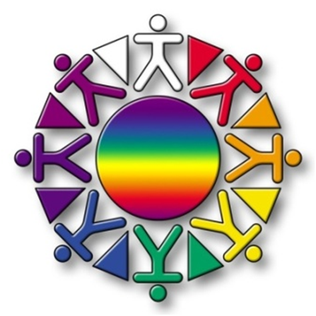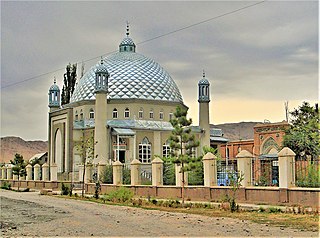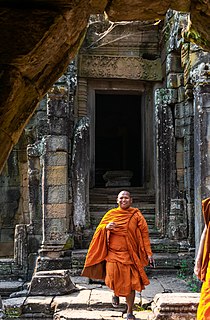Related Research Articles
In secular usage, religious education is the teaching of a particular religion and its varied aspects: its beliefs, doctrines, rituals, customs, rites, and personal roles. In Western and secular culture, religious education implies a type of education which is largely separate from academia, and which (generally) regards religious belief as a fundamental tenet and operating modality, as well as a prerequisite for attendance.
School prayer, in the context of religious liberty, is state-sanctioned or mandatory prayer by students in public schools. Depending on the country and the type of school, state-sponsored prayer may be required, permitted, or prohibited. Countries which prohibit or limit school prayer often differ in their reasons for doing so. In the United States, school prayer cannot be required of students in accordance with the Establishment Clause of the First Amendment to the United States Constitution. This is generally rigorously applied in public schools; the Establishment Clause does not prevent prayer in private schools that have no public funding. In Canada, school-sponsored prayer is disallowed under the concept of freedom of conscience as outlined in the Canadian Charter on Rights & Fundamental Freedoms. School-sponsored prayer is disallowed in France as a byproduct of its status as a secular nation. Countries that allow or require school and other state-sponsored prayer include Greece, Saudi Arabia, Iran, and Australia. The United Kingdom also requires daily worship by law, but does not enforce it.
Religious education is the term given to education concerned with religion. It may refer to education provided by a church or religious organization, for instruction in doctrine and faith, or for education in various aspects of religion, but without explicitly religious or moral aims, e.g. in a school or college. The term is often known as religious studies.

Peace Mala, is a British Registered Charity based in Morriston in Swansea, Wales dedicated to fostering inter-cultural and inter-faith tolerance through the manufacture, distribution and wearing of a symbolic mala (bracelet) whose beads represent various faiths.
The Constitution of Chad provides for freedom of religion; however, at times, the Government limited this right for certain groups. There are seldom reports of societal abuses or discrimination based on religious belief or practice. The different religious communities generally coexisted without problems, although some tensions between different Muslim groups and between Muslims and Christians were reported.

Islam is the main religion in Kyrgyzstan, and the constitution guarantees freedom of religion. Kyrgyzstan is a multicultural and multi religious country with Islam, Buddhism, Baháʼí, Christianity, Judaism, and other religions all having a presence in the country. Muslims constitute the main religious group in Kyrgyzstan with about 90% of the population as of 2017.
Freedom of religion in Tajikistan is provided for in Tajikistan's constitution. The country is secular by law. However, respect for religious freedom has eroded during recent years, creating some areas of concern.
Myanmar has been under the rule of repressive authoritarian military regimes since 1962. After the 1974 Socialist constitution was suspended in 1988, constitutional protection of religious freedom has not existed, after the bloody suppression of the 8888 Uprising. The authorities generally permitted most adherents of registered religious groups to worship as they choose; however, the government imposed restrictions on certain religious activities and is accused of abusing the right to freedom of religion.

The Constitution provides for freedom of religion, and the government has generally respected this right in practice. Buddhism is the state religion. There was no change in the status of respect for religious freedom by the government during the period covered by this report, and government policy continued to contribute to the generally free practice of religion. There were limited reports of societal abuses or discrimination based on religious belief or practice.
The Constitution provides for the freedom to practice the rights of one's religion and faith in accordance with the customs that are observed in the kingdom, unless they violate public order or morality. The state religion is Islam. The Government prohibits conversion from Islam and proselytization of Muslims.
The Constitution provides for freedom of religion and creeds and the exercise of all religious rites provided that the public order is not disturbed. The Constitution declares equality of rights and duties for all citizens without discrimination or preference but establishes a balance of power among the major religious groups. The Government generally respected these rights; however restricted the constitutional provision for apportioning political offices according to religious affiliation since the National Pact agreement. There were periodic reports of tension between religious groups, attributable to competition for political power, and citizens continued to struggle with the legacy of the civil war that was fought along sectarian lines. Despite sectarian tensions caused by the competition for political power, Lebanese continued to coexist.
In Russia, freedom of religion is in principle a guaranteed right under the Constitution of the Russian Federation. The prominence and authority of various religious groups is closely tied to the country's political situation. In the 10th century, Prince Vladimir I, who was converted by missionaries from Byzantium, embraced Christianity as the official Russian religion. For approximately 1,000 years thereafter, Russian Orthodoxy became the country's primary denomination.
The Constitution of Andorra provides for freedom of religion, and the Government generally respects this right in practice. There is no state religion; however, the Constitution acknowledges a special relationship with the Roman Catholic Church, which receives some privileges, although no direct subsidies, not available to other religious groups. There are no reports of societal abuses and discrimination based on religious belief or practice.
The Accord Coalition for Inclusive Education is a campaign coalition of civil society groups and individuals which seeks to ensure all state funded schools in England and Wales are made open and suitable for all, regardless of staff, children or their family's religious or non-religious beliefs. Launched in 2008, the group campaigns for state funded schools to better facilitate religious mixing and the growth of mutual understanding between those of different beliefs, in the interests of equal opportunity, integration and cohesion in society.

The Birmingham Humanist Group was formed on 23 May 1962 at the Arden Hotel, New Street, Birmingham, England, at a meeting convened by Dr Anthony Brierley. It changed its name to Birmingham Humanists in 2000 and voted to become a Partner Group of the BHA, which changed its name to Humanists UK in 2017. It holds most of its meetings at the rooms of the Community Development trust in Moseley, Birmingham.
The Trojan Horse scandal, also known as "Operation Trojan Horse" or the Trojan Horse affair, refers to a scandal involving claims of an alleged conspiracy that there was an organised attempt to introduce an "Islamist" or "Salafist" ethos into several schools in Birmingham, England. The name, based on the Greek legend, comes from an anonymous letter sent to Birmingham City Council in late 2013, alleged to be from Birmingham "Islamists" detailing how to wrest control of a school, and speculating about expanding the scheme to other cities. The letter was leaked to the press in March 2014. Around a month later, Birmingham City Council claimed that it had received "hundreds" of allegations of plots similar to those illustrated in the letter, some dating back over 20 years. Tahir Alam, former chairman of the Park View Educational Trust which ran three schools in Birmingham, was alleged to have written a 72-page document for the Muslim Council of Britain in 2007 detailing a blueprint for the "Islamisation" of secular state schools. This document was, in fact, guidance about the religious needs and practices of Muslim parents and pupils that would facilitate their integration into schools. It was entitled, Towards Greater Understanding: Meeting the Needs of Muslim Pupils in State Schools. Information and Guidance for Schools and is available as an appendix to the Kershaw Report. Its intentions are clearly set out in the introduction where its states, "its purpose is to promote greater understanding of the faith, religious and cultural needs of Muslim pupils and how they can be accommodated within schools. It also provides useful information and guidance and features of good practice in meeting those needs."
Section 70 of the School Standards and Framework Act 1998 stipulates that pupils of community, foundation or voluntary schools in England and Wales must take part in a daily act of Collective Worship, unless they have been explicitly withdrawn by their parents. The same requirement is applied to academy schools via their funding agreements, so it is true to say that all maintained schools in England and Wales are subject to the same rules. However, in practice there is widespread non-compliance with the legislation, which has not been monitored by Ofsted since 2004.
The status of religious freedom in Africa varies from country to country. States can differ based on whether or not they guarantee equal treatment under law for followers of different religions, whether they establish a state religion, the extent to which religious organizations operating within the country are policed, and the extent to which religious law is used as a basis for the country's legal code.
The status of religious freedom in Europe varies from country to country. States can differ based on whether or not they guarantee equal treatment under law for followers of different religions, whether they establish a state religion, the extent to which religious organizations operating within the country are policed, and the extent to which religious law is used as a basis for the country's legal code.
Freedom of religion in Romania refers to the extent to which people in Romania are freely able to practice their religious beliefs, taking into account both government policies and societal attitudes toward religious groups.
References
- ↑ Grove, J. 2009 A Handbook for SACRE members, London: NASACRE, 16f.
- ↑ QCA 2008 SACREs and Community Cohesion: QCA annual analysis of SACRE annual reports from 2006/7, London: QCA.
- ↑ Rose, D. W. 1998 'A Survey of Representative Groups on SACRE', Journal of Contemporary Religion 13(3): 387
- ↑ Revell, L. 2008 'Religious Education in England', Numen 2-3: 218-240
- ↑ Bausor, J. and Poole, M. 2002 'Science and religion in the agreed syllabuses - an investigation and some suggestions', British Journal of Religious Education 25: 18-32., 20.